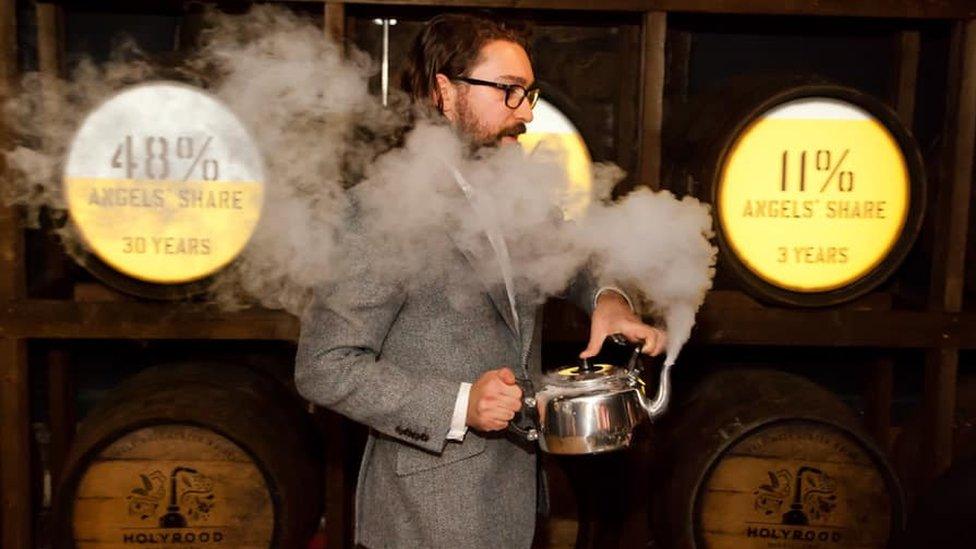Whisky expert 'livid' over alcohol advertising report
- Published

Blair Bowman at the Holyrood distillery in Edinburgh
A whisky expert has criticised a Scottish government report that suggests banning the sale of alcohol-branded merchandise.
Industry leaders fear it could harm distilleries across Scotland.
They dismissed a claim in the report that, without marketing and branding, alcohol products are "essentially variations of the same thing".
The Scottish government said it would speak to those in the industry before introducing any legislation.
The report aims to reduce alcohol-related hospitalisations and deaths by restricting alcohol advertising.
It said marketing can prompt children and young people to start drinking or to drink more, or incentivise heavy drinkers and harm their attempts to abstain.
Restricting advertising is one of the World Health Organization's suggested measures for preventing and reducing alcohol-related harm.
Blair Bowman, a whisky consultant and broker in Scotland, said he was "livid" at "extreme proposals" in the report.
He said the Scottish government should seek to address issues with alcohol at a grassroots level.
"It would be so damaging to tourism in Scotland, it just wouldn't make any sense," he said.

"The implications are pretty enormous and I don't think they've been fully thought through in terms of the mechanics of what that would mean.
"A lot of these distilleries are in really beautiful, amazing rural communities and they bring fantastic numbers of tourists to these places and they can keep these jobs in these places.
"A lot of gin and whisky distilleries and breweries sell these branded glasses and more as souvenirs and if they were suddenly told they couldn't sell them anymore, it would be very difficult and very surreal."
He said it was was "disrespectful" to suggest that alcohol products were variations of each other in the report.
"What makes Scottish whisky so special is how incredibly diverse and unique every distillery is and every expression in every cask," he added.
The report also seeks to address alcohol sponsorship in sport by prohibiting alcohol-branded sports merchandise.
It also suggested banning alcohol advertising in public spaces, further restricting visibility of alcohol in retail spaces, and prohibiting alcohol sponsorship of sports and events.
"I don't think the cultural side has been considered," he said.
"Most of our amazing world class events that happen in Scotland, like the Edinburgh Fringe Festival or Scottish Ballet, are dependent heavily on drinks brand sponsorship to stay afloat because they just don't receive enough arts funding."
There is a code of practice for alcohol advertising already in place, but the report said current regulation and monitoring is largely complaints-led.

Mr Bowman addresses clients at a whisky tasting event in Kuala Lumpur, Malaysia
The government report, external is at a consultation stage, with members of the public encouraged to give feedback on the proposals.
Mr Bowman urged people to share their views on the report before the deadline on 9 March.
"It looks like they've copied the playbook for tobacco," he said.
"Yes alcohol is harmful, but if it's in moderation and within the guidelines it can be part of a healthy, responsible, balanced lifestyle.
"It just doesn't make sense to target everybody for something that is such an important product to our economy."
A Scottish government spokesperson said: "Alcohol-related harm is one of the most pressing public health challenges that we face in Scotland.
"An average of 700 people are hospitalised and 24 people die each week from illnesses caused by drinking alcohol.
"The public health minister will be meeting key stakeholders, including the alcohol and advertising industries during the consultation period, to hear directly from them.
"This is a first wide ranging consultation on this issue and any proposals we take forward into legislation are subject to the consultation responses. We are not introducing legislation at this stage."